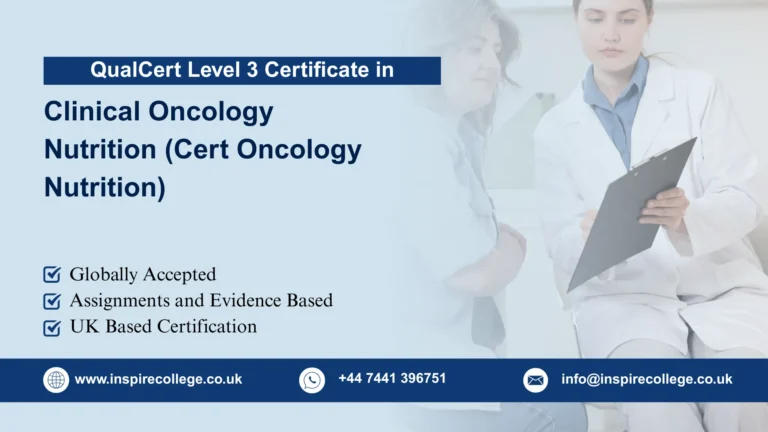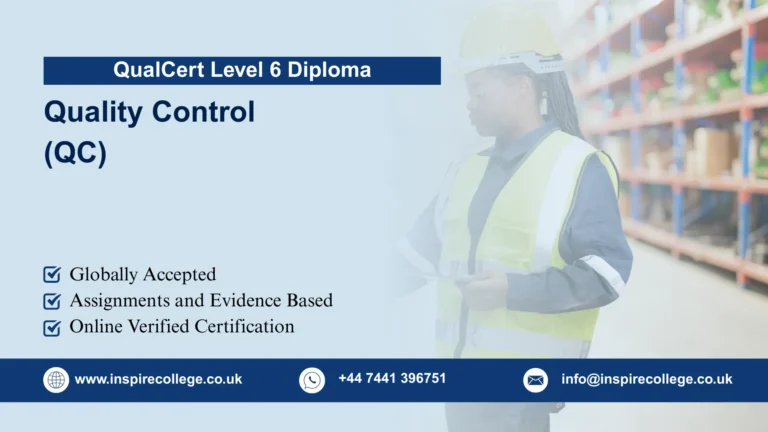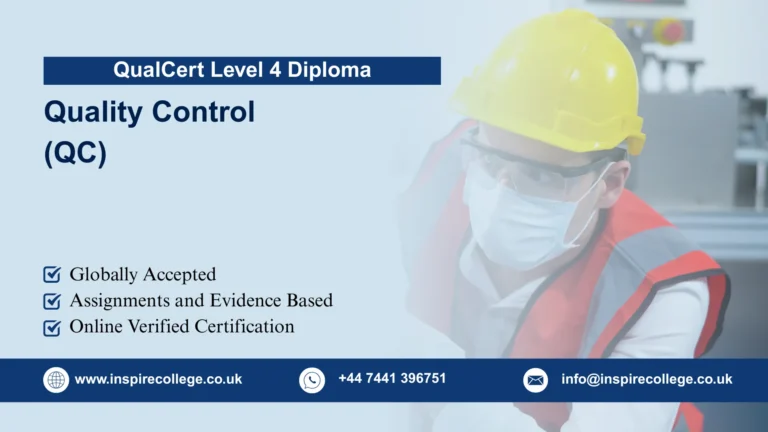
QualCert Level 3 Diploma in Basic Life Support BLS Training
In today’s technology-driven world, software quality plays a vital role in ensuring efficiency, reliability, and customer satisfaction. Organizations across industries rely on structured quality control (QC) systems to minimize errors, maintain compliance, and deliver high-performing software solutions. The QualCert Level 2 Diploma in Quality Control (QC) Software has been carefully designed to introduce learners to the essential concepts, methods, and practices of quality assurance, offering a clear pathway into this important field.
QualCert Level 2 Diploma in Quality Control (QC) Software provides a strong foundation in the principles of software quality control and testing methodologies, making it ideal for individuals who are at the beginning of their journey in software assurance. Learners will explore the basics of error detection, validation processes, compliance requirements, and the role of quality monitoring in software development. By combining theoretical knowledge with practical applications, QualCert Level 2 Diploma in Quality Control (QC) Software ensures learners can apply fundamental QC techniques in real-world scenarios.
Throughout the program, participants will gain valuable skills such as identifying software defects, using QC tools, supporting testing processes, and applying recognized standards for quality assurance. These skills not only enhance employability but also prepare learners for progression to higher-level qualifications in software quality control and related IT fields.
The QualCert Level 2 Diploma in QC Software is suitable for aspiring IT professionals, recent graduates, and individuals seeking to build a career in quality assurance. By completing QualCert Level 2 Diploma in Quality Control (QC) Software, learners will develop the confidence and competence to contribute effectively to software testing teams and quality-focused projects.
To ensure that learners are well-prepared and able to succeed in the QualCert Level 2 Diploma in Quality Control (QC) Software, candidates are expected to meet the following entry requirements:
- Educational Background
- Applicants should have at least a high school diploma or an equivalent qualification.
- While a formal background in computer science, information technology, or related fields is an advantage, it is not strictly necessary.
- The course is structured to accommodate learners from a variety of academic pathways, making it accessible to beginners as well as those with some prior knowledge.
- Basic Computer Skills
- Candidates must demonstrate fundamental computer literacy.
- This includes the ability to navigate operating systems, use word processing and spreadsheet applications, and carry out basic internet searches.
- Comfort with digital learning platforms and common software applications will help learners progress smoothly through the course.
- Understanding of Software Development (Recommended)
- A general awareness of software development processes and methodologies will be beneficial.
- Familiarity with concepts such as coding, debugging, and the software development lifecycle is advantageous, although not mandatory.
- This foundational understanding can help learners grasp quality control principles more effectively.
- English Language Proficiency
- As the course is delivered in English, applicants should be able to read, write, and communicate effectively in the language.
- Non-native speakers may be required to provide proof of language ability through a recognized qualification or proficiency test.
- Adequate language skills are essential for engaging with course content, completing assessments, and participating in discussions.
- Motivation and Commitment
- Learners should demonstrate a genuine interest in software quality assurance and control.
- A strong commitment to completing assignments, attending sessions, and actively participating in learning activities is required.
- Motivation and dedication are key to achieving success in the program and building a solid foundation for future studies or career advancement.
Mandatory Units
The QualCert Level 2 Diploma in Quality Control (QC) Software comprises several study units designed to provide learners with a comprehensive understanding of QC principles and practices in the software sector. Below is the qualification structure, including the Total Qualification Time (TQT) 180, Guided Learning Hours (GLH) 120, and 30 Credits associated with the program.
- QC Software Process Implementation
- Statistical Methods in QC Analysis
- QC Risk Assessment and Mitigation
- Automated QC Systems and AI Integration
- Industry Best Practices in QC
- Report Writing and Decision-Making Using QC Software
In the modern software industry, maintaining high standards of quality is essential for delivering reliable, efficient, and user-friendly applications. The QualCert Diploma in Quality Control (QC) Software equips learners with the knowledge, tools, and methodologies needed to implement effective quality assurance processes. This course covers everything from fundamental QC principles and risk assessment to advanced statistical analysis, automation, and AI integration, providing a comprehensive understanding of how software quality is managed and optimized.
QC Software Process Implementation and Analysis
- Fundamentals of Software Quality Control Processes
- Gain a solid understanding of core software quality control (QC) frameworks and methodologies.
- Learn the principles and objectives of quality assurance in software development.
- Explore structured approaches to maintain software reliability, compliance, and efficiency.
- Software Quality Assurance Lifecycle
- Identify and analyze the key stages of the QC lifecycle, from requirement analysis to final testing.
- Understand how each stage contributes to overall software quality and user satisfaction.
- Apply lifecycle knowledge to plan and manage quality control activities effectively.
- Application of Quality Control Techniques
- Implement standard QC methods to ensure software meets industry standards.
- Develop structured testing strategies to detect defects early and improve reliability.
- Learn practical techniques for monitoring, validating, and verifying software quality.
Statistical Methods in QC Analysis
- Defect Detection and Prevention
- Use statistical methods to identify software errors, anomalies, and recurring issues.
- Apply quantitative techniques to evaluate software performance and reliability.
- Data Analysis for Quality Improvement
- Analyze QC data using statistical tools to identify trends, patterns, and areas of concern.
- Interpret statistical reports to make informed, data-driven decisions in software testing.
- Process Enhancement
- Implement data-supported strategies to improve software development processes.
- Monitor metrics and KPIs to ensure continuous improvement in quality outcomes.
QC Risk Assessment and Mitigation
- Risk Identification
- Recognize potential risks in software development and quality assurance processes.
- Assess how defects or quality failures can impact software performance and user experience.
- Risk Mitigation Strategies
- Develop and implement corrective and preventive measures to minimize risks.
- Apply structured approaches to reduce defect rates and enhance software reliability.
Automated QC Systems and AI Integration
- Automation in Quality Control
- Understand the role of automated testing tools in enhancing QC efficiency.
- Learn how automation reduces manual errors and accelerates testing cycles.
- AI-Driven Quality Assurance
- Explore the integration of AI solutions for software testing and defect prediction.
- Analyze AI-based tools to improve testing accuracy and decision-making processes.
- Implementation of Automation Strategies
- Develop methods to incorporate AI and automation into existing QC workflows.
- Evaluate the impact of automated processes on overall software quality.
Industry Best Practices in QC
- Global Standards and Compliance
- Apply internationally recognized quality control standards in software testing.
- Understand regulatory requirements and compliance frameworks in QA processes.
- Continuous Improvement Methodologies
- Implement Lean, Six Sigma, and other improvement methodologies for ongoing software quality enhancement.
- Study industry case studies to evaluate successful QC implementations and lessons learned.
Report Writing and Decision-Making Using QC Software
- Structured Reporting
- Develop clear, detailed reports documenting QC findings and test results.
- Present data effectively using charts, dashboards, and software tools.
- Data-Driven Decision Making
- Interpret QC metrics to support strategic and operational decisions.
- Communicate quality control results effectively to stakeholders at all levels.
- Documentation Management
- Utilize QC software tools for report generation, storage, and presentation.
- Ensure that documentation aligns with compliance and industry standards.
The Level 2 Diploma in Quality Control (QC) Software is designed for a broad range of learners who want to build a career in software quality assurance or enhance their existing knowledge and skills. This course is particularly suitable for:
- Aspiring Quality Control Professionals
- Individuals aiming to start a career in software quality control and assurance.
- The course provides foundational knowledge of QC principles, testing techniques, and software validation processes.
- Learners gain practical skills to effectively implement quality control strategies in real-world software development environments.
- Recent Graduates
- Graduates from computer science, information technology, or related fields seeking specialization in software quality assurance.
- The diploma bridges the gap between academic study and industry expectations, preparing learners to handle practical challenges in quality control.
- It enhances employability by equipping graduates with both theoretical understanding and practical experience.
- Current IT Professionals
- IT staff working in roles such as software development, systems analysis, or technical support who want to transition into quality control.
- The course helps diversify their skill set and gain recognized expertise in software quality assurance.
- Learners develop competencies that can support career growth and cross-functional opportunities.
- Software Testers
- Professionals currently engaged in software testing who wish to formalize their experience with a recognized qualification.
- The course introduces structured approaches to testing, defect management, and quality assurance methodologies.
- Participants refine their skills and gain confidence to handle more advanced QC tasks.
- Managers and Team Leaders
- Leaders overseeing software development or IT teams seeking a deeper understanding of quality control processes.
- The diploma equips them to implement and monitor QC procedures, ensuring teams maintain high-quality standards.
- Learners gain insights into aligning quality control with organizational goals and project management requirements.
- Professionals Seeking Career Advancement
- Individuals already working in QC or related fields who want to enhance their qualifications for higher-level roles.
- The course demonstrates a commitment to professional development and mastery of key quality assurance practices.
- It supports career progression within software QA, project management, and IT leadership roles.
- Career Changers
- Individuals from non-technical backgrounds interested in transitioning into software quality control.
- While basic computer literacy is required, the course provides a thorough introduction to QC concepts, processes, and practical applications.
- Learners gain the knowledge and confidence to successfully enter the field of software quality assurance.
Register Now
QualCert Level 2 Diploma in Quality Control (QC) Software






